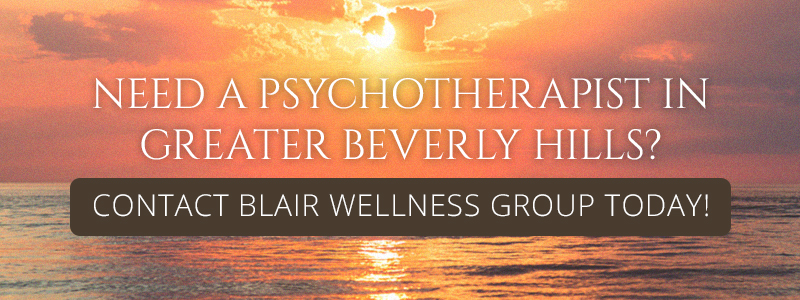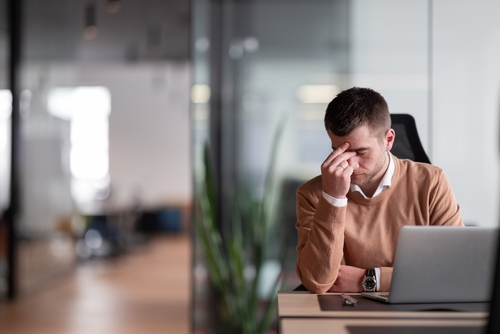The Coronavirus pandemic has ruled 2020 with fear, anxiety, and a disruption to daily life for millions of people all over the world. Initially, most people had feelings of disbelief having not ever been through a pandemic or understanding the implications. This disbelief quickly turned into anxiety and fear over traumatic events and the uncertainty around when it would all end.
Fast forward nine months and people are still living in fear of the unknown, paralyzed by looming health concerns and complications from prolonged stress. The day when you can get back to a “normal” routine and no longer have to fear going outside or hugging a friend can’t come soon enough. Unfortunately, the thought that a vaccine will instantly change our lives and return us to a pre-pandemic time is somewhat misguided. There is great potential for many people to experience long-lasting implications from COVID-19 whether they were actually infected with the virus or not.
In today’s blog from Blair Wellness Group of Beverly Hills, we would like to explore some of those lasting psychological effects to improve awareness and help others take a proactive approach to their mental health.
Persistent Anxiety and Mood Swings
Existing in an environment of constant turmoil and fear of the unknown can take a significant toll on your mental health and those living during the time of this pandemic will be at a greater risk of developing long-standing anxiety and stress disorders. Well after we have a vaccine, some will still worry about its return and have trouble getting back to a new normal. Living in fear is no way to live — not only can it affect your work and your relationships, but it can also diminish your overall quality of life.
Increased Risk of Developing PTSD
PTSD, otherwise known as post-traumatic stress disorder, may develop when a person has experienced a traumatic event. For those who contracted the Coronavirus or have lost friends or family members to it, it comes as no surprise that they will be at an increased risk of developing this debilitating disorder. PTSD affects everyone differently — while some people recover over the course of a few months, for others, the symptoms can persist for much longer.
Depression as a Result of Loss
Losing something or someone that you loved is never easy, and unfortunately, there has been much loss on account of COVID-19. Some have lost their jobs, others their security, and many have lost people who are close to them. Experiencing just one of these is difficult enough, but many people are having to cope with multiple losses at a time, prompting them to feel even more isolated and depressed.
Isolation and Grief Over Missing Milestones
Living in social isolation for an extended period of time is difficult, but when social distancing orders result in your missing out on special celebrations and milestone events, the effect on your mental state can be long-term. Consider those who have had to postpone their wedding, have missed out on a milestone birthday, or skipped their special anniversary vacation. Those are once-in-a-lifetime events that you’ll never be able to get back. Even if you do reschedule them, many wonder if they’ll still be the same.
Children and young adults are also feeling the effects more than most over missing out on life moments. Learning from home has already had a negative impact on social interaction and feelings of isolation but many are grieving and harboring resentful feelings over missing out on milestones like prom and graduation.
Adoption of Harmful Coping Mechanisms
Whether because of stress, boredom, depression, or loneliness, many people have turned to unhealthy methods of coping to numb their feelings. This year has seen a significant rise in alcohol consumption and the longer the pandemic continues, the greater the chance of someone developing an addiction. Although alcohol may be one of the most common forms of addiction, with more people spending a significant amount of time at home and on their computer, there’s also an increased risk of developing other forms such as Social Media Addiction, Pornography Addiction, and Gaming Addiction.
Relationship Issues
Dealing with stress and traumatic events can put a strain on any relationship, but when you’re spending more time in close quarters with someone, it can really make things difficult. Even those with strong and healthy relationships may find theirs is being put to the test. For others who were already in a stressed or dysfunctional relationship when the pandemic started, the prolonged time spent in isolation with the other person could be making the situation worse.
Minimizing the Long-Term Mental Health Impact of COVID-19
Although this has been a long and arduous year, it’s important to remember that this, too, will pass and you’ll be able to resume some sense of normalcy and see your loved ones once again. Until then, it’s important to stay steadfast in your efforts to minimize risk to your physical and mental health. You can do this by practicing self-care, seeking support (even if through talking to a friend or finding a virtual support group), and practicing positive coping habits.
Contact Blair Wellness Group
If you are struggling with anxiety, depression, stress, relationship issues, or other mental health challenges, we encourage you to reach out for professional help from a licensed clinical psychologist. At Blair Wellness Group of Beverly Hills, we are dedicated to helping our clients achieve optimum emotional and psychological health through individualized treatment plans that include one-on-one treatment sessions and the use of various evidence-based treatment modalities. Under the compassionate, confidential, and supportive care of Dr. Cassidy Blair, you’ll receive effective solutions for your particular challenges or struggles.
We offer treatment and treatment to clients in Hollywood, Santa Monica, Malibu, Bel Air, and the Greater Los Angeles Area as well as in our Beverly Hills office. Our concierge-style of care allows you to direct pay for services while benefiting from priority scheduling 7-days a week, with the convenience of being able to receive treatment in-person, or through telephone, teletherapy, or virtual sessions. For better mental health now, and in the future, contact Blair Wellness Group today to schedule an appointment.
Dr. Cassidy Blair is a renowned Licensed Clinical Psychologist and trusted Performance Coach who specializes in providing Concierge-Psychological Care and Executive Coaching for high-achieving professionals. With a deep understanding of the unique challenges faced by CEOs, executives, entrepreneurs, and leaders, Dr. Blair offers tailored, confidential care designed to foster emotional well-being, personal growth, and professional excellence. Her clientele values her discretion, clinical expertise, and emotionally intelligent approach to navigating complex personal and professional dynamics.
- This author does not have any more posts.









